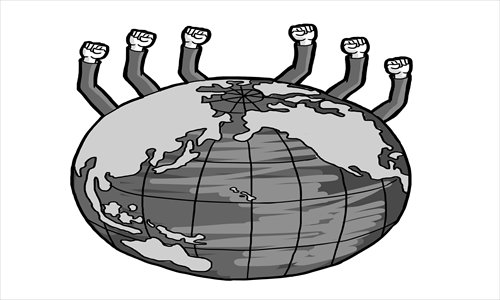Fragmented information puts angry crowds out on street

Public awareness of environmental protection and public health has grown stronger ever since the protests over the controversial PX project in Xiamen, Fujian Province in 2007. Environmental and health issues have now become some of the hottest in China, and more and more people are seeking to defend their rights and interests in these affairs.
On Saturday, residents of Qidong, Jiangsu Province took to the streets to voice their concerns over the construction of a paper factory's waste disposal system that may jeopardize the local maritime environment. After negotiating with the public, local authorities announced on the spot that they would permanently pull the project.
A closer examination of both the incident in Qidong and similar protests elsewhere shows that these public protests over environmental concerns were mostly influenced by fragmented information circulating on the new media.
Objectively, issues regarding environmental protection often need more in-depth knowledge to grasp. Otherwise incomplete information can be easily misinterpreted and cause serious public panic.
In the era of new media, information is becoming increasingly fragmented. This is a challenge that both the public and the government face in their handling of environmental issues.
The public should strive to remain calm, objective and rational, so that they will be able to resist the negative influence of fragmented information and avoid becoming short-sighted or even violent in expressing their concerns.
Being objective and rational can also help the public locate where their interests truly lie, as they will then spend more time in researching the issues they are concerned and learn what in particular matters to them, rather than blindly throwing around accusations.
Take the Qidong case. People who participated in the protest should at least have known that the paper factory was already operating in 2011 and the waste water was being dumped into the Yangtze River after it was processed to meet the disposal requirement.
The construction of the waste disposal system in Qidong this time was aimed at lifting the pressure off the Yangtze River by directing the waste to the sea, which can better digest it. What's more important is that all this information was published in 2010.
Therefore, if the public is concerned about the safety of drinking water in the Yangtze River, they should look in detail at what toxic elements the waste water contains, and in what amounts. And if the public is concerned about the damage to local fisheries, they should show what was incorrect in the document published by the government in 2010.
It's glad to see that some residents who participated in the Qidong protest are already thinking about this strategy now.
In fact, if the public can put more of their passion and energy toward researching these questions, their supervision of the government can become more effective. This is something that stripping off the local mayor's shirt cannot achieve.
As to the government, it must learn how to communicate with the public. Currently, local governments in China often choose to either show a hard-line stance on protests or take the easy route by unconditionally accepting the public's demand.
But neither way is effective, despite different reactions from the public. Adopting a hard-line stance on public protests is not only wrong but also stupid, while an unconditional compromise only shows how lazy, incompetent and irresponsible a government is.
To establish a smooth relationship with the public, the government should be able to identify what the short-term and long-run requirements of its people are, then provide opportunities for the public to join in the policymaking process and inform and convince the public about its plans. Only through this can the government survive challenges in an ever-changing modern society.
The author is a lecturer in the Department of International Politics at Fudan University. opinion@globaltimes.com.cn
Public needs say in decisions about local environment